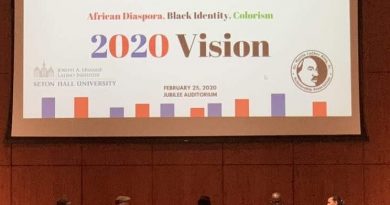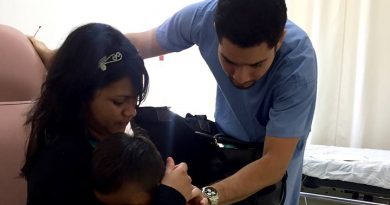UNGA President Dennis Francis Visits Seton Hall University
Alex Lee
Staff Writer
On March 26, 2024, Seton Hall University’s School of Diplomacy and International Relations hosted the President of the 78th General Assembly of the United Nations, Dennis Francis. He spoke to students, faculty, and alumni in a discussion on the role of the UN General Assembly in accomplishing the goals he set out for his administration as they aim to move toward peace, prosperity, and sustainability for all. The interim President of Seton Hall University, Katia Passerini, opened the event with a speech that stressed the importance of rising to the occasion of taking on a position of power, and aiming for lofty goals.
His Excellency Dennis Francis began his talk with a speech, addressing in particular the students of the audience, stressing the need for a proper education. Noting that in 2015, the UN passed Sustainability Development Goal 4, emphasizing the need for a movement bringing forth universal proper and good education, he encouraged students to learn as much as they can, as well as to begin sharpening critical thinking and analytical skills.
Explaining why he chose the goals of his administration, Francis argued that without peace, cooperation would be impossible on an international level. He also noted the interesting dichotomy that he believes exists within peace: when peace exists, anything is possible; when it is lacking, it becomes a destroyer of lives. He then discussed prosperity, noting that we live in a world where there is plenty, yet there have never been more people in poverty. He points out that poverty for many of these people will be abject until 2060 at the very earliest.
While no goal is no more important than another, Francis explains, sustainability is especially vital. Without finding sustainable solutions to our current problems, our generation will destroy any hope left for those of the future. The UN has been remarkably successful in keeping world peace. While there are many conflicts within the world, the UN has successfully managed to halt a major war between the great powers. This, Francis regards as an unparalleled success. He does point out its failures, however, acknowledging that the international system and the UN failed to prevent Russia’s invasion of Ukraine and the war between Israel and Hamas. Although the UN recently passed a resolution demanding a ceasefire for the Ramadan season, the topic had endured months of debate and gridlock. In the view of Francis, the deaths which resulted from the lack of UN productivity as its conversations were gridlock were completely preventable. Additionally, the violation of Ukraine’s sovereignty resulted in food and energy crises felt around the globe. Francis humbly faults the UN Security Council’s (SC) failure to prevent these conflicts, explaining that members of the council may have other interests outside of international peace.
Toward the end of his speech, the President of the UNGA related his advice to individual students at Seton Hall University. Francis believes strongly that the voices of the youth and the future leaders of the world need to be heard, listened to, and amplified. He has urged member nations to reach out to young generations. However, he explains that young people must take charge and ensure their own education; the problems facing the world right now will soon become the responsibility of only the younger generations. He discussed current problems facing the world that he believes will affect the youth disproportionately, specifically answering questions about climate change. He shares that the unbridled desire for economic growth is the leading reason for climate change. As young people, Francis believes that it is not just possible but necessary to take absolute charge regarding climate change. Not only does it present a clear danger right now, but it will be the leading threat of the future. Climate change is by nature a global threat, leaving it relevant to the UN, which shares a core value of leaving no one behind.
What may be his most profound piece of advice occurred as Francis answered a student’s question. Upon being asked what he has found to be the best tactic for organizing disparate parties, he responded by explaining that most people at a fundamental level want the same things: safety, to provide for their families, to give their children a good education, and to make a contribution to society. Francis stressed that the most important step in negotiations is recognizing that all people possess human dignity, not exercising power. This advice, which proved to be a theme throughout the President’s speech during his visit, is relevant not only to the School of Diplomacy students in the audience, but all of humanity.
Image courtesy of Getty Images


